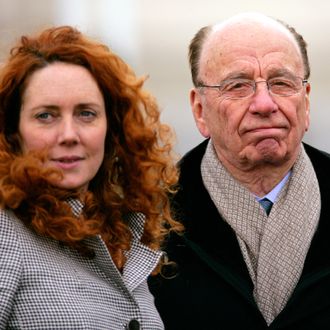
Back on July 4, the Guardian blew the News Corporation phone-hacking scandal wide open with a report that the News of the World tabloid hacked the phone of young murder victim Milly Dowler while she was thought to be kidnapped. The report said that journalists listened to messages on her phone and then deleted them to make room for more, in hopes of getting exclusive information about the story. The fact that the messages were being removed from her phone reportedly gave Dowler’s family hope that she was still alive. This revelation led to worldwide outrage directed at the News of the World and its parent company, Rupert Murdoch–owned News International, and just days later, the tabloid was shuttered entirely. Piles of subsequent phone-hacking allegations have surfaced against the company, but it turns out that the early, infuriating detail about the Dowlers may not have been entirely accurate.
The Guardian has since posted a correction: “Evidence secured by the police following the publication of this article has established that the News of the World was not responsible for the deletion of voice-mails which caused Milly Dowler’s parents to have false hope that she was alive.” A Guardian spokesperson clarified, “Our story on July 4 accurately reported the facts about the hacking of Milly Dowler’s phone known at the time … Although the investigation has found that the News of the World was not responsible for the particular deletion of voicemails which caused Milly’s parents to have false hope that she was alive, the new evidence also suggests that it is likely the paper’s staff were inadvertently responsible for deleting later messages.” The paper maintains that the News of the World, or its private investigator Glenn Mulcaire, hacked the girl’s phone, but in the words of Guardian reporter Nick Davies, “the police could no longer be sure exactly who had caused the particular deletions that led to that ‘false hope’ moment.”
As was explained yesterday at a phone-hacking inquiry, “The most likely explanation is that existing messages automatically dropped off from the mailbox after 72 hours. The relevant phone network provider has confirmed that this was a standard automatic function of that voice-mail box system at the time.” As such, the Guardian’s correction seems like a pretty substantial one to be affixed to the bottom of a six-month-old story. But the Dowler family maintains that they were told by police that the News of the World was responsible for the missing voice mails.
It is possible that the Murdoch tabloid would not have have closed down so quickly (or at all) without the distinct uproar from that initial Dowler report, in all its inhumane detail. As one British editor from a Guardian rival noted, “If, as seems not unlikely, we end up with a less free press, it may at least in part be the result of The Guardian making an incorrect allegation which it has now furtively retracted.”
But Davies contends, “It is delusional to pretend the new evidence of one element of one story would have changed the outcome.” The phones of about 800 people were still likely hacked. And an anonymous former News of the World journalist concurs: “The fact that they didn’t even bother to challenge an accusation that has been proved to be partly false proves that [News International] chose to sacrifice the News of the World in attempt to protect the lion’s share of its business in the United States.”





























